improving extractives governance
PNGEITI Report Releases
The EITI holds all implementing countries to the same global standard. Through Validation, the EITI’s quality assurance mechanism, implementing countries are assessed on their ability to meet the provisions of the EITI Standard.
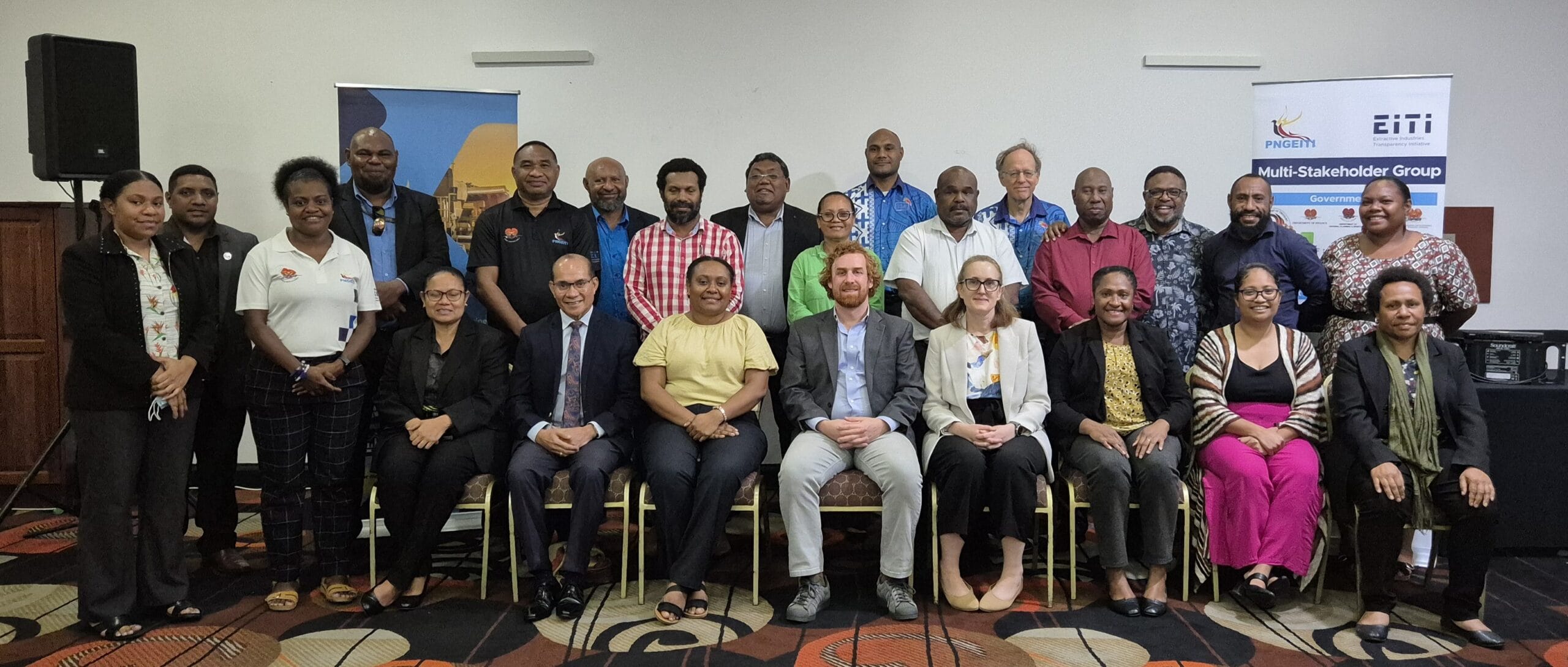
Papua New Guinea Advances EITI Implementation Readiness with Pre-Validation Workshop in Port Moresby
In a crucial step towards improving transparency and governance in the extractive industries, the Papua New Guinea Extractive Industries Transparency Initiative (PNGEITI) convened a two-day Pre-Validation Workshop from 9–10 June in Port Moresby. The workshop brought together members of the Multi-Stakeholder Group (MSG) and staff from the PNGEITI National Secretariat The two-day workshop was facilitated by Asia Country Manager Ms. Sarah Hayton and Validation expert Mr. Riley Zecca from the EITI International Secretariat’s Validation Team with the primary focus to prepare Papua New Guinea for its upcoming EITI Validation scheduled to commence in January 2026. EITI Validation is a cornerstone of the global Extractive Industries Transparency Initiative (EITI) process. It provides an independent and comprehensive assessment of a country’s performance in disclosing critical extractive sector data—from licensing and production to revenue flows and public spending. For Papua New Guinea, EITI Validation is not merely a compliance measure—it is a vital tool for reform. It fosters informed policy dialogue, builds public trust, strengthens institutional frameworks, and demonstrates the country’s commitment to transparency to investors and development partners. The recent Pre-Validation Workshop was strategically designed to support this reform agenda by explaining the Validation process and agreeing on the preparatory steps that the Multi-Stakeholder Group (MSG) must undertake. It also provided hands-on training for MSG members on the newly introduced Validation templates, reviewed outstanding corrective actions from the 2022 Validation, and developed an action plan to address them. In addition, the workshop focused on building capacity around key disclosures required under the revised 2023 EITI Standard, particularly in emerging areas such as energy transition, gender, and anti-corruption. By the end of the two-day session, MSG members had developed a clearer understanding of the specific actions required to close existing implementation gaps and strengthen Papua New Guinea’s standing ahead of the 2026 EITI Validation. Key outcomes of the workshop included a shared understanding of the critical steps needed to achieve full compliance with the EITI Standard, agreement on roles and responsibilities for addressing corrective actions, and the development of a draft timeline outlining key activities to be undertaken in preparation for the upcoming Validation. Speaking on the significance of the workshop, PNGEITI Executive Director Mr. George Kauli stated “This two-day Pre-Validation Workshop has been a timely and strategic opportunity for us to regroup, refocus, and build a shared understanding of what is required for Papua New Guinea to meet the EITI Standard. As we prepare for Validation in 2026, it is critical that all stakeholders—government, industry, and civil society—are aligned in their roles and responsibilities. Our collective commitment to transparency, accountability, and reform will ensure that the benefits from our extractive sector are managed responsibly and equitably for all Papua New Guineans.” This statement reaffirms PNG’s national commitment to transparency and sets a collaborative tone for the coordinated efforts needed as the country advances toward its next Validation. Papua New Guinea last underwent Validation in 2022, during which the EITI International Board awarded the country an overall score of 70.5 points, indicating a moderate level of progress in implementing the EITI Standard. The score was based on an average of three component areas: While the 2022 results reflected PNG’s strong commitment to transparency, the Validation also identified several gaps—particularly in data accessibility and the completeness of reporting. Addressing these gaps is critical for improved governance and accountability. In a resource-rich country like Papua New Guinea, where the economy is heavily reliant on mineral, oil, and gas revenues, the transparent and equitable management of these resources is essential to achieving sustainable development. The Pre-Validation Workshop has set a clear and structured path forward to enhance good governance, strengthen public oversight, and ensure that the benefits of extractive resources are shared fairly among all Papua New Guineans.

George Kauli Appointed as New Executive Director of PNGEITI National Secretariat
The Papua New Guinea Extractive Industries Transparency Initiative (PNGEITI) has a new Executive Director and he is George Kauli. Mr Kauli succeeds Lucas Alkan, who served as the organization’s first head since its establishment in 2013. PNGEITI governing and oversight body, the PNGEITI Multi Stakeholder Group (MSG), appointed Mr. Kauli after a rigorous recruitment process. Mr. Kauli brings a wealth of experience in policy, governance, and resource sector management, backed by a distinguished career spanning over two decades. He holds a Bachelor of Arts in Environmental Sciences & Physical Geography from the University of Papua New Guinea, complemented by numerous certificates in energy governance, economic aspects of production sharing, and public service induction from institutions in the USA, Australia, and PNG. Since joining PNGEITI in 2024 as Director of Policy and Programs, Mr. Kauli has led the Secretariat’s preparation for transition into a Commission. He also played a lead role in ensuring subnational reporting clauses were integrated into major resource agreements such as the Porgera Community Development Agreement and the recently initialled Hidden Valley Community Development Agreement—a first for the PNG extractive sector. Prior to PNGEITI, Mr. Kauli held several senior roles at the Department of Mineral Policy and Geohazards Management, contributing to the review of major mining laws and policies, and representing Papua New Guinea in international forums on deep sea mining and sustainable resource development. He brings a wealth of experience to drive the National Secretariat through. Mr. Kauli expressed his gratitude to the MSG (Multi-Stakeholder Group) for having confidence in him. The PNGEITI MSG is a tripartite body comprising key economic government agencies, all mining and petroleum companies in operations, and relevant civil society bodies including Transparency International PNG. “I am honored to take on this role and would like to thank the MSG for their confidence in me. I am committed to working collaboratively to further strengthen transparency and accountability in our resource sector,” he said. He also acknowledged Mr. Alkan’s significant contributions. “I wish to extend my sincere appreciation to Lucas Alkan for his dedicated service over the years. His efforts have laid a strong foundation that has propelled EITI implementation in PNG forward, setting us on the path to progress to the next level,” Mr. Kauli remarked. Mr. Kauli highlighted immediate initiatives following his appointment. “One of our immediate priorities is passing the PNGEITI Commission Bill, which will formalize and strengthen the organizational framework. Additionally, we are preparing for PNG’s third EITI validation, set to commence in 2026. These two tasks are chief among other important tasks immediately before me to execute head-on going forward,” he said. “Together with our stakeholders, I am eager to advance our programs and ensure that our extractive industries contribute meaningfully to sustainable development and national prosperity,” he added. “Formalizing our legal framework through the Commission Bill will ensure long-term sustainability and give us the mandate needed to implement the EITI Standard he said. “Additionally, the 2026 validation will be a defining moment for PNG, and we are focused on ensuring that all corrective actions and new requirements under the 2023 EITI Standard are fully addressed.”
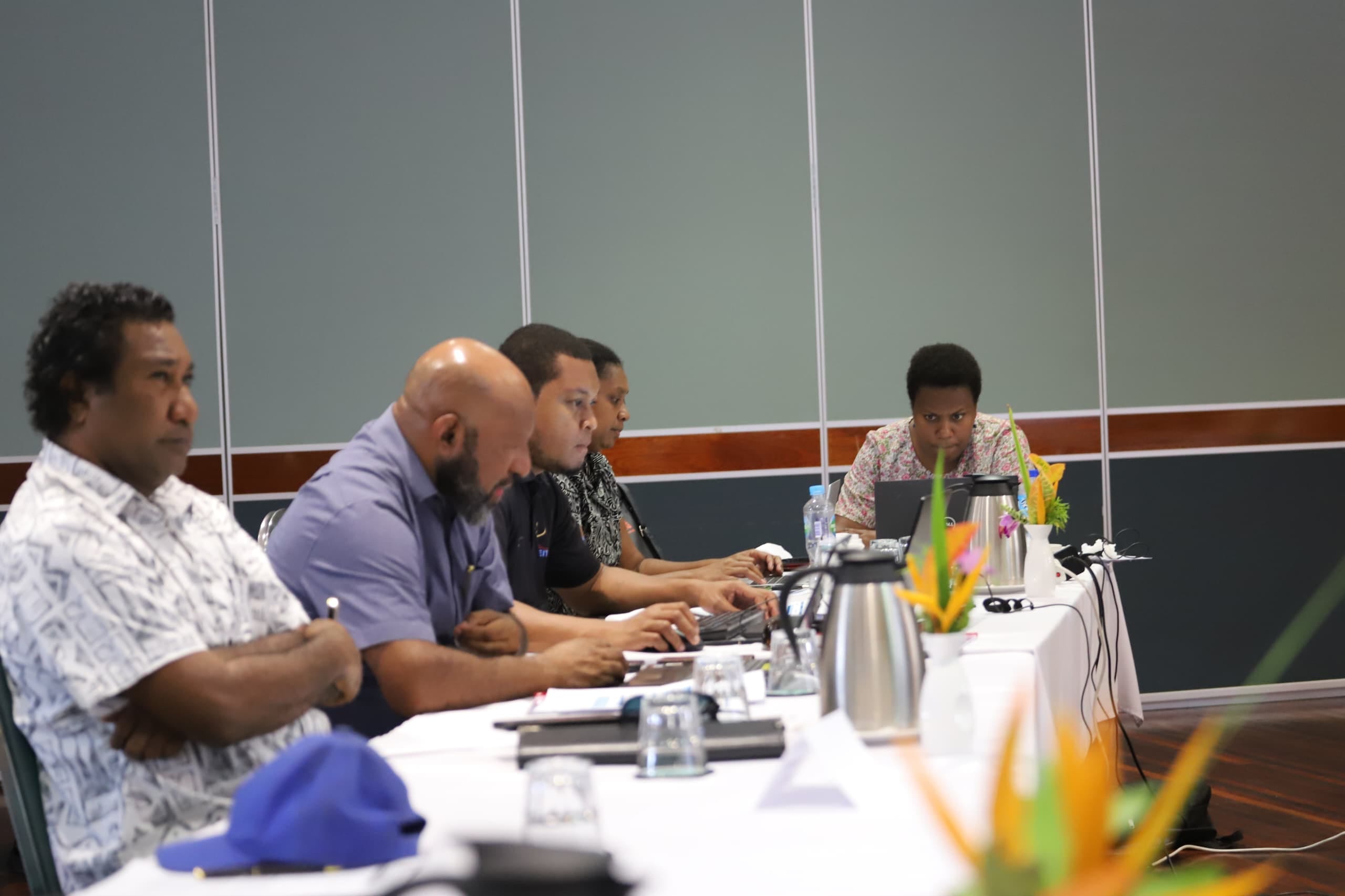
PNGEITI ATTENDS HIDDEN VALLEY MINING MOA REVIEW
The PNGEITI from the 01st – 05th of April attended the week long mining agreement review for Hidden Valley Mine, held in Lae, Morobe province. Director Policy and Programs, George Kauli and Coordinator Junior Kari Ora joined representatives from the National Government, Provincial Government, Local Level Governments, Landowners, project developers among other parties impacted by the operations of Hidden Valley Mining. The aim of the review is to create better agreements that meet community needs, such as infrastructure, education, and healthcare. Negotiations focused on fair compensation for landowners and the importance of community involvement in the decision making process. The week long gathering provided the opportunity to: For EITI, this platform is essential for the following reasons: Chairman of Nakuwi Association, representing landowners attending the week long mining review said “I actually support the inclusion of EITI in this CDA/MoA review. There must be visibility in the royalties distributed to the recipients, and its allocations. It is essential to ensure that the process of reporting are effectively implemented through the inclusion of the EITI Transparency and Accountability clauses. This would involve monitoring and verifying that all revenues and distribution figures are accurately reported and accounted for. This approach would facilitate better management and oversight, thus, addressing the challenges associated with the allocation and utilization of the royalty funds”.
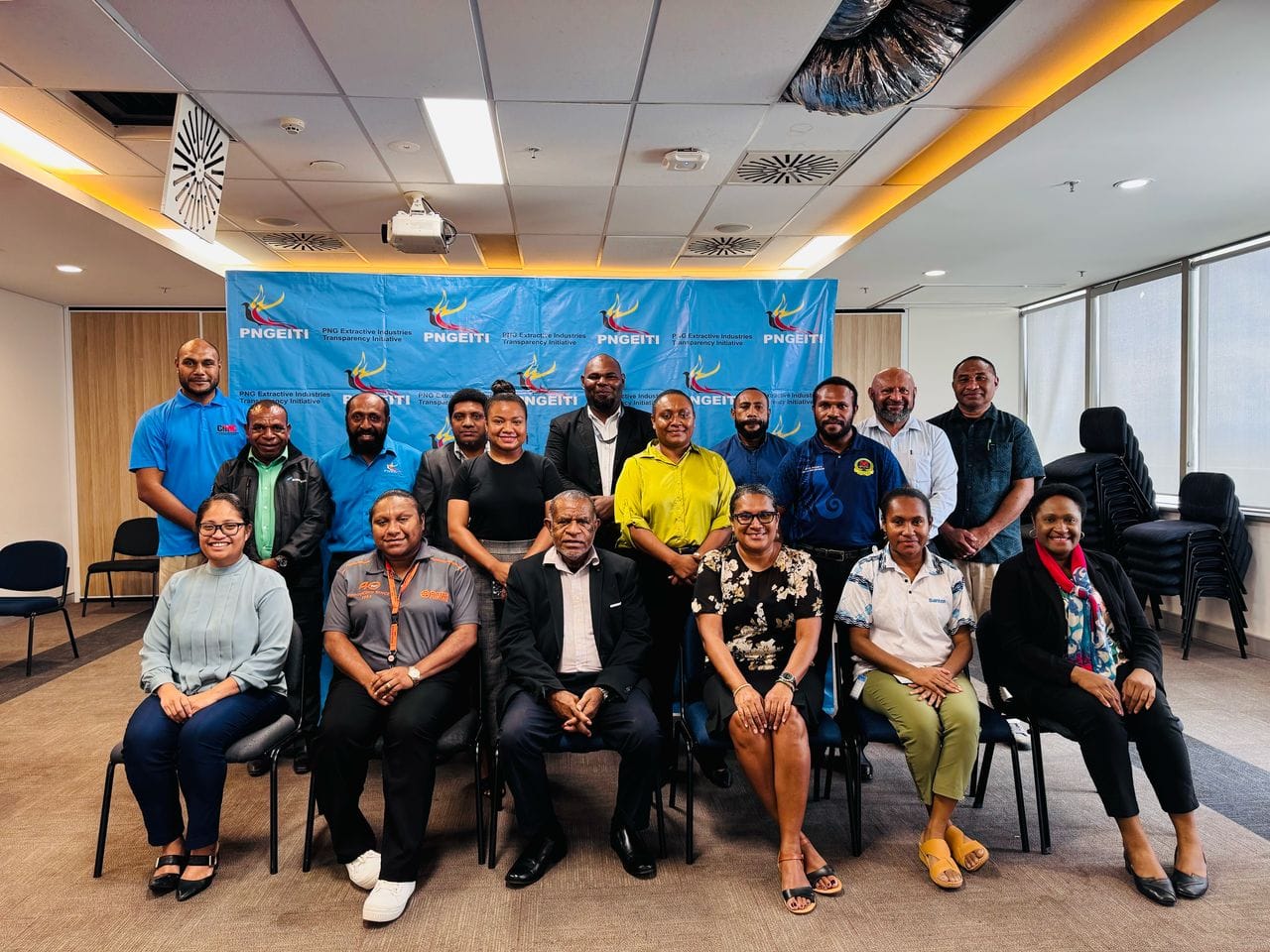
PNGEITI HOSTS MSG MEETING, FIRST QUARTER 2025
The PNGEITI Multi-Stakeholder Group (MSG) held its first quarter meeting of 2025 at Treasury Building, Port Moresby on Friday, April 11th. Acting MSG Chair and Acting Deputy Secretary, John Uware chaired the meeting. The meeting brought together MSG members and PNGEITI National Secretariat to discuss first quarter meeting agenda, key updates and priorities for the year. The meeting began with the review of matters arising from meeting minutes of last quarter 2024 followed by the Quarter Report Presentation by Acting Executive Director, Chris Tabel. Update on 2023 PNGEITI Report Production, Terms of Reference for Financial Year 2024 PNGEITI Report and PNG 2026 Validation were among the agenda presented. Projects and Procurement branch did presentations on projects and tasks on EITI correction actions whilst Policy provided update on the commission bill and disclosure on benefits sharing agreements. Finance, Administration and Human Resource provide update on the following:
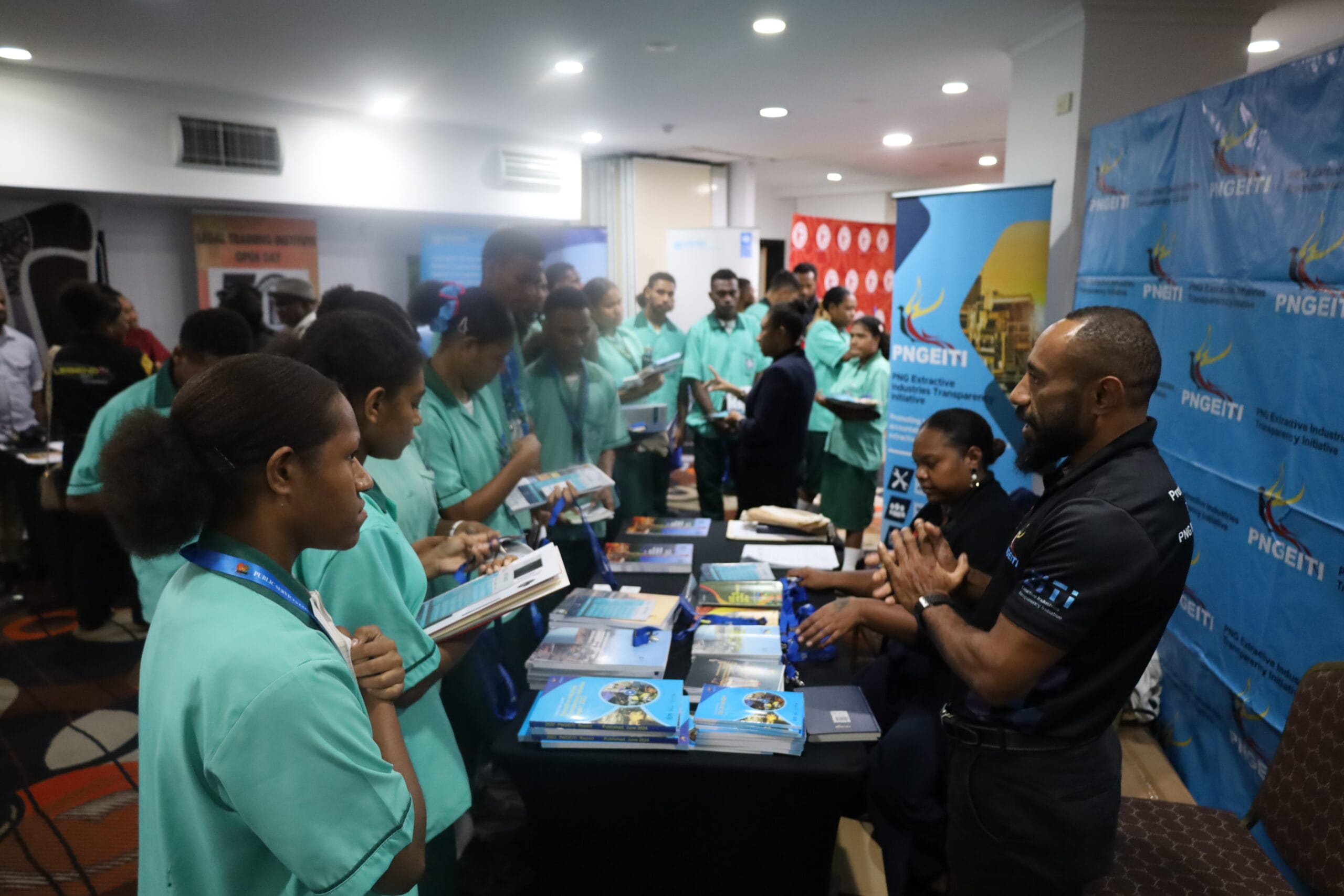
PNGEITI BOOTH ATTRACTS VISITORS AT THE TWO DAY EXHIBITION
PNGEITI, from the 28th-29th of March, participated at the two day exhibition hosted by TIPNG under the theme “Integrity and Action” . The Exhibition provided the opportunity for PNGEITI to highlight its pivotal role in fostering transparency and accountability in the extractive sector. PNGEITI booth was among the star attraction where stakeholders and students among other visitors gathered information, brochures and asked questions on the role of EITI in the extractive sector. Notable among the students were the grade 12 Students from Butuka Secondary School who engaged with PNGEITI staff at the PNGEITI exhibition booth. The students gathered information, brochures and asked questions on the roles of EITI in the extractive sector. “We (PNGEITI) are thrilled to see school children eager to learn how transparency drives sustainable development,” said Chris Tabel, Acting Executive Director. “Our team shared insights on how revenue from the extractive sector are transparently reported and publicly accessible, and this prevents corruption, mismanagement, reinforcing honesty and ethical governance in the sector,” said Mr. Tabel. PNGEITI promotes open and accountable governance by ensuring that revenue from PNG’s extractive sector benefits all citizens. Guest Speaker and one of TIPNG’s founding directors, Dame Meg Taylor in her speech at the opening ceremony emphasized on Integrity, honesty, transparency and accountability. “In Papua New Guinea, as in many nations, the fight against corruption is an on-going battle, it requires constant vigilance, unwavering commitment and collection action. We must all be champions of integrity in our own spheres of influence. This is where the work of Transparency International PNG becomes so vital.” said Dame Meg Taylor. Chief Executive Officer of TIPNG, Arianne Kassman said TIPNG remains committed to its mission as the country’s leading anti-corruption civil society organization, empowering people and organizations to take action against corruption. “Over the past 28 years, we have built a strong reputation, one that we continue to uphold with dedication and resolve. Our work is grounded in the legacy of our Founding Chairman, the Late Sir Anthony Siaguru, who envisioned a society where the integrity of the people, the nation and its institutions are fearlessly protected. Today, as we stand at the forefront of this ongoing challenge, we also recognize the immense opportunities ahead. With your support and partnership, we can transform our collective commitment into real action – driving integrity, accountability and lasting change for PNG,” said Miss Kassman.
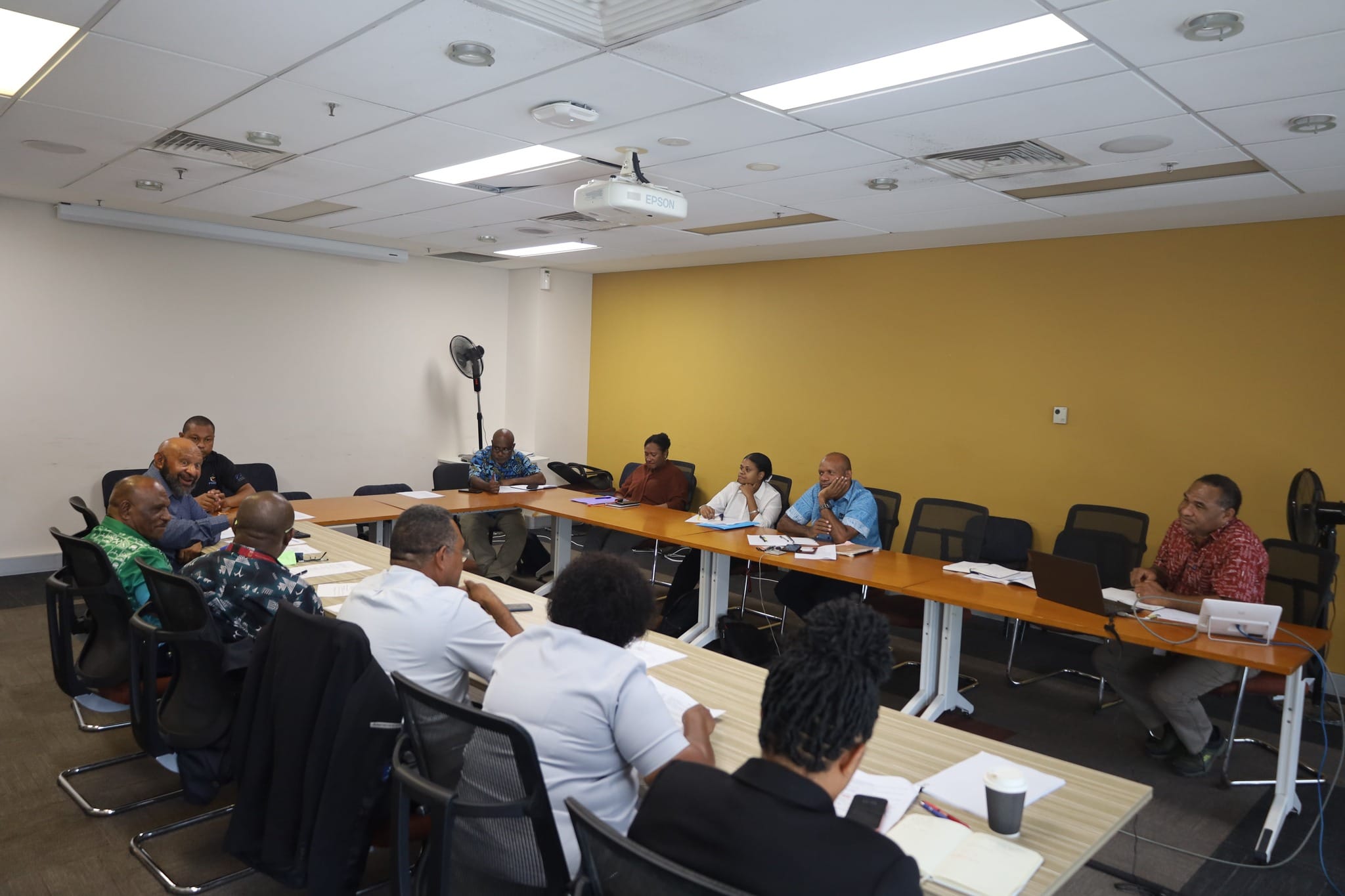
PNGEITI Strengthens Beneficial Ownership Transparency Through Technical Working Group Meeting
The Papua New Guinea Extractive Industries Transparency Initiative (PNGEITI) convened a Beneficial Ownership (BO) Technical Working Group meeting, bringing together key stakeholders to discuss strategies for enhancing BO transparency within the extractive sector. Representatives from the Bank of Papua New Guinea’s Financial Analysis and Supervision Unit (FASU), the Investment Promotion Authority (IPA), the Mineral Resource Authority (MRA) and Department of Petroleum participated in the discussions aimed at accelerating efforts towards full implementation of BO disclosure for the extractive industries sector in PNG. The meeting provided an opportunity to update stakeholders on the progress made so far in advancing BO transparency and to outline the next steps necessary to further strengthen governance and accountability in the extractive industry. Significant progress has been made in PNG’s efforts to enhance BO transparency, dating back to the initial scoping study in 2017. The study identified key challenges, including legal gaps, lack of awareness, and data collection difficulties. Key milestones achieved since then include: A critical issue raised during the meeting by FASU concerned the scope of BO disclosure under Anti-Money Laundering (AML) standards. While AML regulations mandate BO disclosure to competent authorities such as law enforcement agencies, PNGEITI’s Standard 2023 and Requirement 2.5 calls for public disclosure of BO information in the extractive industries sector. The discussion underscored the need for a clear boundary of public access to BO data while ensuring compliance with both national and international standards. Investment Promotion Authority (IPA) representative, Mr. Maru, highlighted that the Amended Companies Act 2022, specifically Section 72(a), mandates companies to provide Beneficial Ownership (BO) information and identify the beneficial owners of shares. He further noted that the IPA serves as the custodian of BO data. PNGEITI Director for Projects and Procurement, Mr. Diclah Taureka, emphasized the need for a standardized BO disclosure framework, stating, “To progress beneficial ownership disclosure in line with PNGEITI requirements, we are proposing the development of a contextualized BO disclosure reporting template, which will be refined in consultation with key stakeholders.” Supporting this, PNGEITI Director of Policy and Programs, George Kauli, reinforced that while PNG adheres to EITI Global Standards, implementation strategies must be tailored to the local context. He stated, “What is practiced in Papua New Guinea may differ from other EITI-implementing countries. The Companies Act 2022 provides the legal foundation for BO disclosure across all companies operating in PNG. For PNGEITI purposes, our focus for 2025 is to develop a contextualized BO disclosure template specifically focused on extractive industries.” To further advance Beneficial Ownership (BO) transparency, the Papua New Guinea Extractive Industries Transparency Initiative (PNGEITI) and key stakeholders have outlined priority actions for 2025. These initiatives include conducting comprehensive training sessions for government officials, companies, and other stakeholders on BO requirements, disclosure processes, and compliance measures. Additionally, PNGEITI will develop and distribute guidance documents to assist companies in fulfilling their BO disclosure obligations. A nationwide awareness campaign will also be launched, utilizing television, radio, print media, and social media platforms to educate the public on the importance of BO transparency. Furthermore, PNGEITI will host public forums and town hall meetings to facilitate open discussions among civil society, industry associations, and government agencies. Lastly, ongoing support will be provided to companies to strengthen their capacity in meeting BO requirements effectively. PNGEITI remains committed to fostering transparency, accountability, and good governance within the extractive sector. The outcomes of the BO Technical Working Group meeting reaffirm Papua New Guinea’s dedication to implementing global best practices in BO disclosure while ensuring alignment with local regulatory frameworks.

